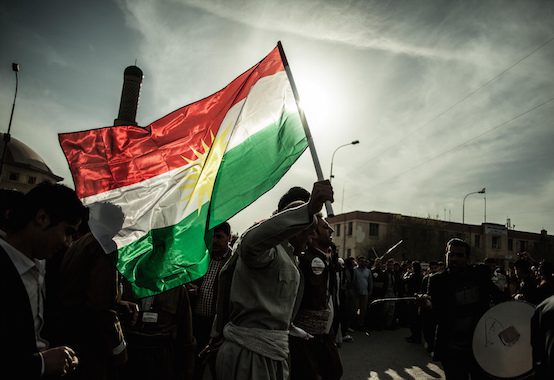The Backlash Against the Kurdish Referendum Continues

The backlash against the Kurdish referendum continues:
Iraq’s prime minister, angered by a vote on independence by his nation’s Kurdish minority, has given the country’s Kurdish region until Friday to surrender control of its two international airports or face a shutdown of international flights.
The Iraqi ultimatum follows Iran’s move to close its land border with Iraqi Kurdistan after it had already closed its airspace to flights in and out of the region. Turkey is threatening to shut down oil exports out of Kurdistan:
Turkey can choose to “close the valves” on oil exports from Iraq’s Kurdish region through the Turkish port of Ceyhan, President Recep Tayyip Erdogan warned as Kurds voted in a referendum on independence from Iraq.
The landlocked Kurdish enclave in northern Iraq can ship as much as 700,000 barrels a day through the pipeline to Ceyhan on the Mediterranean. The Turkish president’s comments served as a reminder that Iraq’s semi-autonomous Kurdistan Regional Government depends on good relations with neighboring Turkey for most of its oil sales.
Just as Iraqi Kurdistan depends on good relations with its neighbors to export its oil, it is heavily dependent on imports from the outside. According to the FT, around 80% of their goods are imported. If both Turkey and Iran decide to wage an economic war on Kurdistan in coordination with Baghdad, the region will be deprived of both revenue and goods and their economy will be ruined. The dependence on food imports is even greater:
The shelves of any supermarket in the region illuminate the risk for the Kurdish region: Almost all products are either trucked through or made in Turkey.
“Everything is imported,” said Amer Abdullah, 40, who sells foodstuffs brought from Turkey at the wholesale market. “If the borders are closed, in one month everything would be finished.”
These are the conditions that make a viable independent Kurdistan practically impossible so long as its neighbors are determined to oppose it. The economic ties that supporters of the referendum assumed would protect Kurdistan from retaliatory measures had the opposite effect: it is the region’s economic dependence on its neighbors that makes its political independence against their wishes hard to imagine. This week Alex Dziadosz made the economic case against a Kurdish state:
Because the KRG’s roughly 600,000 barrels per day of oil exports are piped almost exclusively through Turkey to the port of Ceyhan, Ankara has enormous leverage not only over the region’s economy, but over the resource-distribution systems underlying social stability, such as the government’s ability to pay salaries. “Oil is the main source of revenue in the region and all of that falls into the government’s coffers. So that’s it—the KRG’s economy depends on one pipeline that sells oil to international markets and the pipeline goes through Turkey. You shut down that pipeline, you choke the Kurdish economy,” Bilal Wahab, an analyst at the Washington Institute for Near East Policy, told me.
The other major problem is the region’s heavy reliance on imports, which account for some 80 to 90 percent of goods, analysts estimate. The region produces significant amounts of cement, steel, and wheat, but little else. Walk through Erbil’s downtown market and you will see pomegranates from Egypt, apples from Iran, and peaches and eggs from Turkey—not to mention clothes and household goods from China and cigarettes from as far as South Korea. Because Kurdistan is land-locked, shutting its borders with Iran and Turkey and airspace through Iraq could quickly lead to sharp spikes in prices or shortages of basic goods such as food and fuel. A coordinated blockade by the region’s neighbors would be devastating.
It was a measure of how weak the case for an independent Kurdistan was that all of these practical obstacles have been ignored or waved away by supporters. Proponents of backing a new Kurdish state are in such a hurry to turn it into their latest vehicle for hostility to Iran that they failed to think through how much leverage the governments opposed to the new state have over the region. The U.S. should urge all parties to refrain from additional actions that would inflame the situation, but there is not much else that the U.S. can do at this point.
Comments